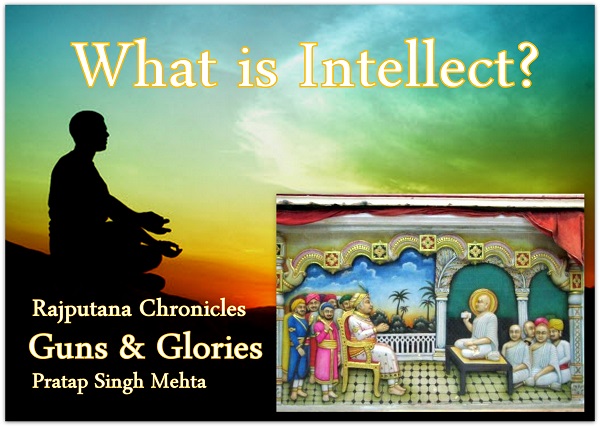What is #Intellect? Who is #Intellectual Person?
During the course of campus interview I asked a lady applicant, “What kind of man would you like to see as your life partner?”
She responded, “Sir, an intellectual person with good sense of humour.”
We have been using this term very often. But, do we really know what intellect means? It reminds me of a story from GUNS & GLORIES about the spiritual interaction with Jain #Acharya #Jinchandra Surji at the Lahore court of Emperor #Akbar in 1592 AD. The Jain Acharya, while discussing intellect said, “It is nothing but the power to discriminate. An increase in this power helps us maintain a sense of what is right and wrong while performing actions and implement that awareness”.
During one of the meetings with the learned religious people, Emperor Akbar asked the pundits, “Who was the most learned Jain philosopher?” The pundits replied, “Acharya Jinchandra Suri was one such person”. Emperor asked, “Who is his disciple?” The pundits replied, “#Dewan#KaramChand”.
Acharya further explains, “Many people feel internally and complain that their intellect is not as clear as they would like. One of the aims of meditation and spiritual knowledge is to make the intellect strong, clear and clean, as a result of which there is an increase in the power of discrimination”.
#Meditation brings about self-realisations whereby you realise what is happening inside you. Sometimes, while observing someone, we use the phrase: He/she doesn’t know what he/she is doing, referring to someone who is acting in an incorrect way. If we are to act in an appropriate way, we need to be aware and be awake to the consequences (results) of our actions.
In meditation you feel quiet and you focus your thoughts inwards. In that state, the sound of the voice of the conscience is perceived and heard. It is a voice that is not affected by material worries or a preoccupation about one’s image and public appearance. During meditation, you are completely focused on the present moment of spiritual empowerment and not distracted by: karmas, noise, unrelated ideas of the past and the future, mental chatter, etc., basically everything that separates you from your true spiritual self. In this way you can listen to yourself within and as a result ensure to the maximum extent that your karmas are appropriate and accurate.
Bhanwarlal Nahata of Prakrit Bharati Academy, Jaipur writes in his book ‘Mantri Karam Chand Bachhawat’ that Karam Chand was summoned and ordered to invite his guru maharaj as soon as possible. Acharya reached Lahore on 14th February, 1592 along with 31 disciples on Id day.
The Emperor, who was sitting in the ‘gavaksha’ (throne) of the palace, came down to receive Acharya Jinchandra Suri and after exchanging pleasantries, he said, “I have asked you to come here all the way from Gujarat to benefit from your thoughts at the religious meetings”. He further added, “I strongly believe in non-violence (ahimsa), therefore you must visit my court to give audience, at least once every day so that there is spiritual awakening among my children”. Having received the patronage of the Emperor, Acharya soon became popular and was well received by one and all at Lahore. He stayed there for a year till next monsoon.
Turning Point in Emperor Akbar’s Life
Akbar was greatly impressed by the scholastic qualities and character of the Acharya. This was perhaps the turning point in his life. He held several debates and discussions on religion and philosophy in his courts. Arguing with Jains, Akbar remained skeptical of their atheistic views on God and creation. Yet he became convinced by their philosophy of non-violence and vegetarianism and ended up deploring eating all types of flesh. At the behest of Dewan Karam Chand, the Emperor also issued many imperial orders that were favorable for Jain interests, such as banning animal slaughter and stoppage of fishing.
Jain authors like Upadhyay Jaysom Pathak and others, also wrote about their experience at the Mughal court in Sanskrit texts that are still largely unknown to Mughal historians or maybe they don’t want to discuss.
Dr Serg Trifkovic, author of “The Sword of the Prophet: A Politically Incorrect Guide to Islam” writes, “The best Moslems are generally the least Moslem”.
The discourse by Jain Acharya would end up in a practice session, as below:
True love means the ability to forgive and forget.
My thought for the day:
When there is love there is the ability to look at only specialities/goodness. Even if the other person makes a mistake, there is only the conscious awareness of his specialities. So it becomes easy to forgive the mistake committed by him. When there is real forgiveness the mistake is totally forgotten and the future interactions with that person are free from the negative attitude.
My experience of the day:
When I am able to forgive the mistakes made by others, I am also able to forget them easily. So my mind is free from the burden of waste of all the past mistakes. So I am able to be light even when I am faced with the negativity of the other person. I am never caught up with attitudes about people so I am successful in my relationship with others.
